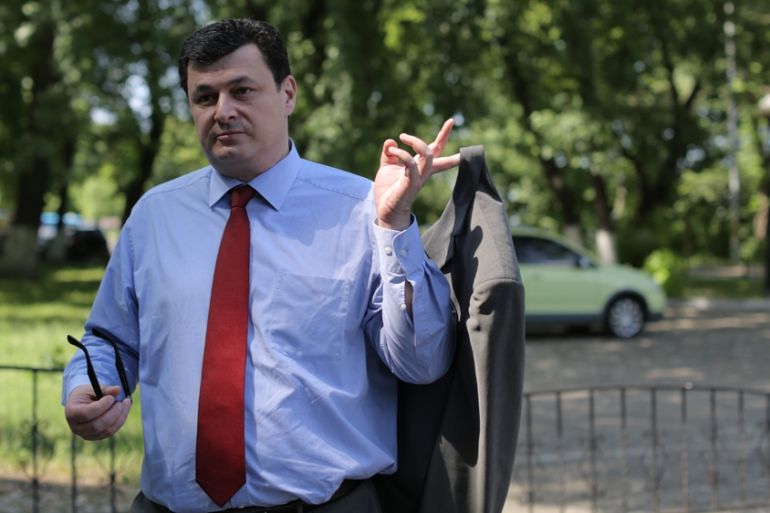Georgians guide Ukraine’s reforms path away from Russia
Kiev grants Ukrainian nationality to Georgia’s ex-president and his team, charging them “to make impossible possible”.

Kiev, Ukraine – “Everything happened within 36 hours,” says Aleksandre Kvitashvili, Georgia’s former health minister.
He arrived in Kiev six months ago, went through a 30-40-minute job interview with Ukraine’s president, prime minister and chairman of parliament. Next day he applied for the country’s citizenship, and just hours later he was appointed Ukraine’s health minister.
He was not the only one.
Eka Zguladze, Georgia’s former deputy interior minister; Gia Getsadze, Georgia’s former deputy justice minister; and Davit Sakvarelidze, Georgia’s deputy prosecutor general, all ended up with the same job titles in Ukraine.
Their former boss, Georgia’s ex-president Mikheil Saakashvili, led them to Ukraine, having moved to the country in an advisory role after the overthrow of Viktor Yanukovich, Ukraine’s pro-Russian president, and the formation of a pro-Western government following the 2014 Maidan revolution.
A president’s move to include foreigners in his government might have caused major public outrage in most countries. However, Ukraine, having endured corruption and administrative mismanagement for more than 20 years since the collapse of the Soviet Union, seems to be looking at the appointments differently.
“Ukrainians are desperate for some kind of positive examples of development, of cracking down on corruption and eliminating criminal underworld,” Saakashvili says.
“And from that standpoint, they have lots of hopes associated with Georgia, which has already tackled these issues.”
Kvitashvili says he inquired during the job interview why the government would want to entrust him – an outsider – with the task of reforming the national healthcare system.
“You have no connection to business interests or any kind of corrupt mechanisms or schemes in the country,” Kvitashvili was told, in addition to his experience in transitional economies and his part in the successful reform process in Georgia.
Ukraine’s healthcare system, which is supposed to be free, is plagued by rampant corruption.
The hospitals are not allowed to accept any funds for the services they provide, dependent as they are on state funding which covers only one-third of all expenditure.
The lack of funding pushes the country’s underpaid doctors to accept bribes from patients, and encourages hospitals to hide funds they receive from charity organisations.
Kvitashvili, who has already dealt with a similar problem back in Georgia, says the situation is “ridiculous”. He says his aim is “moving the system away from the Soviet model and doing things in a civilised way”.
![Gia Getsadze, Georgia's former deputy justice minister, leads reforms in Ukraine's justice ministry [Rabii Kalboussi/Al Jazeera]](/wp-content/uploads/2015/06/3c9017f19f304a7cb451560c03b5bd30_18.jpeg)
“I think it is very important right now to strengthen Ukraine for the final victory. The strengthening of Ukraine means strengthening Georgia, because they are facing the same enemy,” says Getsadze, referring to Russia which is “occupying 20 percent of Georgian territories [Georgia’s breakaway regions of Abkhazia and South Ossetia]” and is widely believed to be backing the conflict in Ukraine’s east.
Getsadze is spearheading reforms in Ukraine’s justice ministry.
“Whatever document people needed to get from the justice ministry used to be linked to bribes or nepotism,” he says.
“Now we have overhauled the system and introduced new digital databases. People are able to print out the documents at home. They come with a unique serial number that equals stamps and signatures.”
The justice ministry also aims to change the way judges are paid and outsource its services to notary bureaus, authorised banks and local self-governing institutions with a view to reducing sources of corruption.
The justice ministry will become a supervisory body instead of being a provider of services as part of the effort to streamline its efficiency.
![Davit Sakvarelidze, Georgia's former and Ukraine's current deputy prosecutor general [Rabii Kalboussi/Al Jazeera]](/wp-content/uploads/2015/06/d48b0265419b4ac99972f6cf45d286ac_18.jpeg)
Despite the spirit of optimism, Davit Sakvarelidze, who is leading similar reforms in the prosecutor general’s office, thinks that he and his fellow Georgians can only achieve limited success in Ukraine.
“We can see solutions to Ukraine’s problems much faster, because we have already dealt with them back home,” he said.
“But we do not have political power here, so Georgian reformers will be only as successful as they are allowed to be by the people in charge.”
Saakashvili, who was recently appointed the governor of Ukraine’s Odessa region, believes President Petro Poroshenko, having charged him “to make the impossible possible”, will provide full support to the positive changes as “containing Russia in Ukraine primarily is based on the idea that Ukraine should reform and develop”.
However, critics say the appointment will be counterproductive, noting that Saakashvili was Georgia’s president during the 2008 five-day Russia-Georgia war and continues to provoke anger from Russian authorities.
“Russians hate the whole idea that if Odessa succeeds, it will have a huge impact on the Russian psyche,” he says. “Odessa is very much part of what they consider the Russian psyche.”
Saakashvili promises to transform Odessa into “an investment paradise” by cracking down on “criminalised officials and criminal gangs that are running the region”.
“Odessa region is strategically important not only to Ukraine but the whole post-Soviet world, especially Georgia,” he says.
“If Odessa falls, Georgia might get wiped off the map or there would be a big threat of that happening.
“I will certainly go back to Georgia when the time comes. But right now this is an amazing opportunity to also help Georgia by helping Ukraine, because Ukraine needs to contain Russia now.”
Follow Tamila Varshalomidze on Twitter: @tamila87v
![Mikheil Saakashvili, governor of Ukraine's Odessa region, was Georgia's president from 2004 to 2012 [Rabii Kalboussi/Al Jazeera]](/wp-content/uploads/2015/06/a0aa84524b8e47dbada368ba118daba8_18.jpeg)